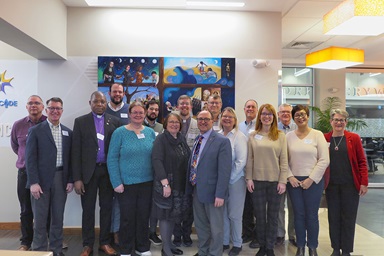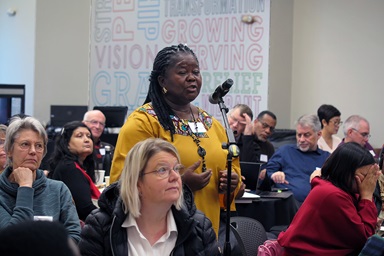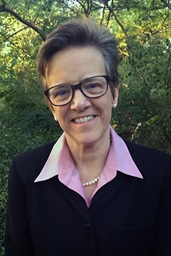It is an honor and a privilege for me to have the opportunity to address the General Conference and to be representing the laity of The UMC. It is an awesome experience to be in the same room with so many ministers, both clergy and lay, from around the world.
Furthermore, I hope I will not be like the little girl who, when asked to make a report in front of the class, found herself at a loss for words and with her knees shaking and with her voice cracking, she said, “I think I could faint if I knew how.”
Please join me in prayer. “Dear God, let the words of my mouth and the meditations of our hearts be acceptable in your sight, O Lord, my strength and my redeemer. Amen.”
The scriptural basis for my message today is one that is very familiar to most of us. It comes from Paul’s letter to the Ephesians, chapter 4 verse 4: “There is one body and one spirit, just as you were called to the one hope of your calling: one Lord, one faith, one baptism, one God of all, who is above all and through all and in all.”
One body, one spirit, one hope of your calling: what part of “one” don’t we understand?
According to definitions of the word “one” I have found, “one” means, “in union, united, forming a whole, joining together as one.” Whether we use “one” as a noun or a verb, it is still an action word implying to me, at least, that it takes some work to make something either become one or remain one.
Often we exert more effort to create divisiveness rather than oneness in the church as well as in the world. What is our problem?
It’s not about us — it’s about God!
It seems to me that until we are willing to let go of “me, myself and I” and make a concerted effort to become “we, ourselves and us” we will continue to be involved in power struggles, selfish decision-making, and un-Christian actions toward each other.
The concern that is most troubling about this “one” thing, specifically our “One in Spirit, All in Ministry” theme, revolves around our apparent unwillingness to be partners in ministry with one another. (Not senior partners and silent partners, but equal partners.) We do a great job of talking the talk, but for the most part we still have not created working partnerships within our denomination, especially in the clergy/laity relationship. We state unequivocally that all baptized Christians are called to ministry, but for the most part it appears that we don’t practice what we preach.
Partnerships are not created overnight, but usually evolve over a period of time. The foundation for building a good partnership must be based on mutual trust, respect, and a willingness to share with one another in a spirit of cooperation.
But, do you know what? If the clergy are singing their own song while the laity are dancing to their own beat, how in the world are we going to get in sync with one another? Unless we do, the church will not be creating the music for which God gave us the notes!
When my grandson, Tyler, was 6 years old, he had his first experience playing on a baseball team, but he had trouble remembering the name of his team. One day, his Dad asked him who he played for and Tyler replied, “The Huskies.” (That was the name of the high school team in their community.) “No”, his Dad said, “think real hard, who do you play for?” Tyler said, “Alabama.” “No, Tyler, you play for the Angels.” With that Tyler went running in and told his Mom to guess who he played for. “Who?” She asked him. Tyler yelled at the top of his lungs, “Jesus!”
Who are we playing for? If we are on Jesus’ team, we’ve got to play together as a team whether we are in the Bishop’s office or the church pew; whether we are in Washington, D.C., Trussville, Ala., Manila, Warsaw, Mozambique, or Kinshasa. It takes all of God’s people to do all of God’s work!
If we could get the “one” thing down, then we could be “all in ministry” and we could get on with working together to fulfill the mission of the church.
One thing we have agreed to agree on is that the mission of the church is to make disciples of Jesus Christ. How we go about fulfilling God’s purpose for the church is up to us. We can write our vision statements, we can set our goals, we can structure our ministry, but I believe we will be held accountable for fulfilling our mission.
In 2nd Corinthians 3:6, we read that “our competence is from God, who has made us competent to be ministers of a new covenant, not of letter but of spirit; for the letter kills, but the Spirit gives life.”
I love the United Methodist Church. Having been a member for a little over two-thirds of my life (up to this point). I consider myself somewhat knowledgeable about church work as well as the work of the church. (There is a difference you know and I can, without a doubt, guarantee you that every delegate and every Bishop in this room has done both!)
Church work is a lot of the busy stuff we do, mostly for ourselves, like debating trivial matters such as what color to paint the fellowship hall and arguing about who’s going to do what.
Church work will wear you out both physically and mentally and even at times spiritually. You know what I’m talking about — attending boring, time-consuming, fruitless meetings; doing jobs that burn us out because they’re not something the Holy Spirit has gifted us to do.
When we are in the church work mode, we are just playing church. We get so busy keeping the letter of the law that we don’t have time for anything else. Maintenance becomes our No. 1 concern; keeping things as they always have been becomes our No. 1 priority.
On the other hand, doing the work of the church is reaching out to others. It is making disciples for Jesus Christ and being actively involved in mission and ministry. (Keeping the spirit of the law.)
When you are doing the work of the church it is exciting, invigorating, and fulfilling. You are filled with passion, joy and enthusiasm. You are inviting those outside the church to come in; you are going out into the world to share the love of Christ in tangible ways; and you are trying to meet the needs of others where they are.
When we are doing the work of the church we are being the church. Ministry becomes our #1 concern; making disciples our #1 priority. We are joined one in spirit, all in ministry.
For 36 years, my family and I were active members of a wonderful very traditional UMC in our community. That church was very special to us, having been our church home for all those years, but we moved to a new community eight years ago and became part of the core group helping to build a new church. There were seven families of us who began meeting weekly in the home of Brenda and Dr. Tommy Gray, the newly appointed pastor, to pray and seek to discern God’s will for the new congregation.
After about six weeks, I began to realize, this new church was going to be clearly different. We agreed that we wanted to connect with those who “don’t have a clue what church is all about.” And friends, there are thousands, millions of people put there who don’t have a clue what church is all about.
Then talk centered around having a “worship center” not a “sanctuary.” Having a “praise team” with a “worship leader,” not a “choir” with a “choir director.” Having guitars and keyboards, not organs and pianos. At that point, I was beginning to feel a little nervous. It all sounded a little irreverent to me, especially the “come as you are” casual dress, “bring your coffee in the worship center” type thing! Then some folks got all excited about getting top-of-the-line sound equipment and large screens to show the videos. For the worship center?
Uh, oh, my United Methodist dander got up a little. After all, I was the Conference Lay Leader. I had been in the UMC for a long time. I knew the routine. I thought you were supposed to have liturgy and a formal style of worship — what we, of my generation in the United States, know as a “traditional” worship service with sacred hymns and ceremony and pomp and circumstance.
Now before you misunderstand, I am not comparing or debating worship styles. I just want to remind us that we must be open to doing worship in new ways.
My new Christian friends kept insisting, “There are lots of unchurched young people, young families in this community. We need to reach those who haven’t been reached by the traditional church. If we are going to be in ministry to those who need it most we must connect with them with things they can understand and relate to.”
It made sense to me, but “it just didn’t sound very United Methodist.”
What in the world was I thinking? Our own founder, John Wesley, focused the Methodist movement to reach people who were neglected by the church and society.
And what about 2 Corinthians 5:17? “See this is a new creation. Everything old has passed away. Everything has become new.”
Listening to the young adults on our planning team, we began to understand what they were trying to tell us. They don’t want to just sit in a worship service and be preached at, they want to see and hear about cultural issues that affect their lives. They want the message to be biblically based and theologically sound and presented in everyday language that speaks to them. They want all of their senses to be involved, even in a worship service, especially in a worship service. They want to feel at ease in church, dress the way they feel comfortable, be able to express their emotions, be involved in “hands on” mission work. Good grief, they even wanted to focus on doing mission rather than being concerned about whether we could afford to do it!
I was pretty much OK up to that point, but that sure wasn’t the way I’d been brought up! (Where are the Finance and Administration police when you need them?) The team wanted to step out in faith, believing that when the Lord gives you a vision, the Lord will also give you the provision.
Some of those thoughts were alien to me, I must confess. We had never done it that way before. I knew exactly what Wesley meant when he said. “I could scarce reconcile myself at first to this strange way of preaching, but I submitted to be more vile.” I was becoming more and more convinced that the Holy Spirit was at work in our midst.
I know we say we are not into numbers, but there are a lot of clergy (and lay people) who like to count heads. I do not apologize for mentioning numbers because each one of those numbers represents a soul — a disciple or a disciple-in-the-making! Our church has grown from the original seven seed families to over 2,000 people in worship. (We had almost 3,200 on Easter Sunday.) The amazing thing is that some had never been in a church before and some of those who were there were in a church for the very first time, some had not been in church in a long time.
Whether you are clergy or laity, the church you are in may be exactly where you feel you need to be. You may be fed there, nurtured there, and perfectly happy there, but would you look around the congregation next Sunday morning? How many young adults are there? How many youth are there? How many children are there? If those age groups are not there and in most of our churches they are not, then it’s a given that your church is not meeting their needs. How do I know they’re not there?
Because according to a recent report, the average age of members of the UMC is 57. Our membership is aging, not getting any younger.
Think about it. Where will your church be in 20 years, 30 years, 50 years? Will it be alive and growing, or will it already be dead and buried?
Don’t tell me that we have to do things the same way we’ve always done them or people will leave the church. What about the people who never came because of that very reason — because we’re not willing to make changes? How can we be “one in spirit” if we are not following the guidance of the Holy Spirit? How can we be “all in ministry” if we are not bringing people to Christ, growing people in Christ, and sending people for Christ?
Another profound statement of John Wesley’s that we need to remember is his view on theological diversity: “In essential beliefs, let there be unity. In those things which are not essential, let there be freedom. In all things let there be love.”
On occasion, I have heard a person make the comment that what the church needs is to “go back to John Wesley.” I would venture to say that the church needs to catch up with John Wesley!
In closing, may I remind you that our call and our challenge is to go out into the world and share the love of God. We must open our doors and look out, open our hearts to be receptive to the needs of the people out there, and open our minds to new ways to be in ministry to them.
Doors, hearts, and minds are like parachutes. They work best when they are open.
In our churches as well as in our lives, often it takes change to reveal God’s purpose. Don’t be afraid to go where you have not been if the Holy Spirit is leading you.
The United Methodist Church through the years since Wesley had his “warming of the heart” has done great things for the Lord. Our denomination has strengths that have enabled us to circle the globe sharing God’s love. We have been in ministry in Jesus’ name to the lost, the poor, the hungry, the sick, those in prison, the weak, the oppressed, the disenfranchised, the least of these. Together we have stepped out in faith. We have spoken out against injustice. We have engaged in ministries of witness, service, and action in our communities and throughout the world. We must keep on keeping on!
My prayer is that the Holy Spirit will rekindle within us a passion for making disciples by forming new communities of faith and renewing existing ones where the good news of Jesus Christ will be shared in relevant and meaningful ways so that lives can and will be changed.
We must become partners in ministry, clergy and laity, laity and laity, clergy and clergy. We must become “one in spirit, all in ministry”
Now, I would like for you to help me prove the point I’ve been trying to make. If I could ask you to stand (as you are able) and if it is possible would you hold up one of your hands in front of your face?
Look at your hand. You know you can do lots of things with your hands. Just by opening, closing, bending, or using your hands for different purposes, you can change the character of your hand.
You can make your hand into a weapon. (Make a fist)
You can communicate with your hand. (Make “I love you” sign)
You can greet someone with your hand. (Wave)
You can vote or show your approval or disapproval with your hand. (Thumbs up or thumbs down)
You can give directions with your hand. (Point)
You can hold something in your hand. (Pick up something)
There are many, many things we do with our hands. God gave us the ability to change our hands, as we need to to perform various functions. Our God is a God of change. God gave us the church that must be ever-changing to meet the needs of today’s world. God expects us to have an innovative and ever-changing ministry based on God’s unchanging word.
Now I would like for you to join hands with the persons next to you to indicate that we are partners in ministry and making a promise to yourself to remember that we are “one in spirit, all in ministry.”
Let us all join together in singing as Barbara leads us: “We are one in the spirit, we are one in the Lord and they will know we are Christians by our love, by our love. And they will know we are Christians by our love.”
SONG: “We are one in the Spirit”
Blessings to you as we join hands and hearts in Christian love and recommit ourselves to serve the Lord “one in spirit, all in ministry.” Amen and amen!
Gloria E. Holt
Laity Address — General Conference 2004
April 28, 2004
Lay Leader, North Alabama Conference
President, Association of Annual Conference Lay Leaders
President, Southeast Jurisdiction Association of Annual
Conference Lay Leaders
Like what you're reading? Support the ministry of UM News! Your support ensures the latest denominational news, dynamic stories and informative articles will continue to connect our global community. Make a tax-deductible donation at ResourceUMC.org/GiveUMCom.



